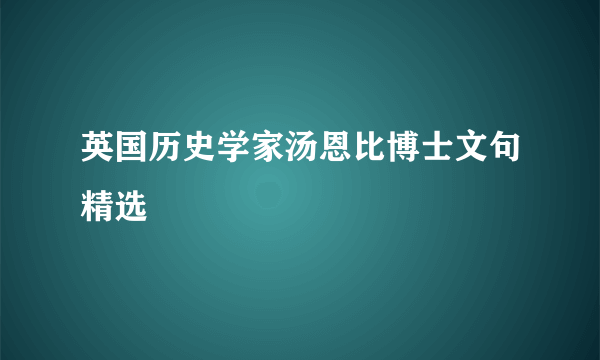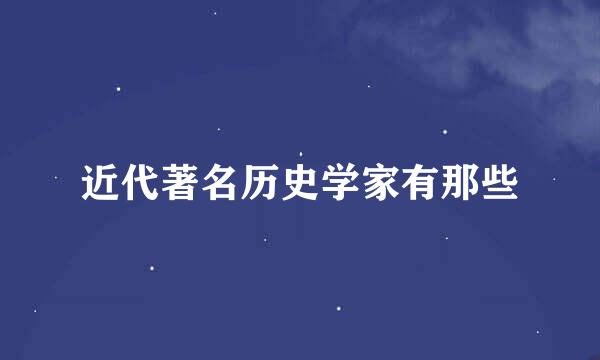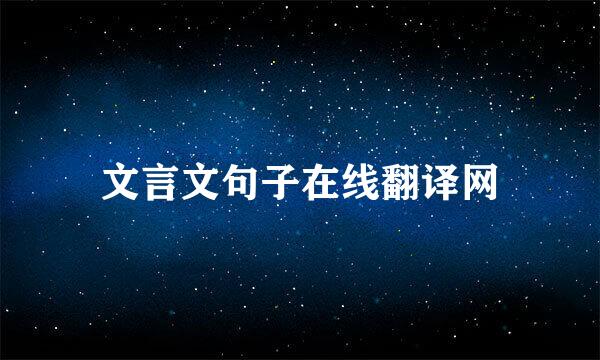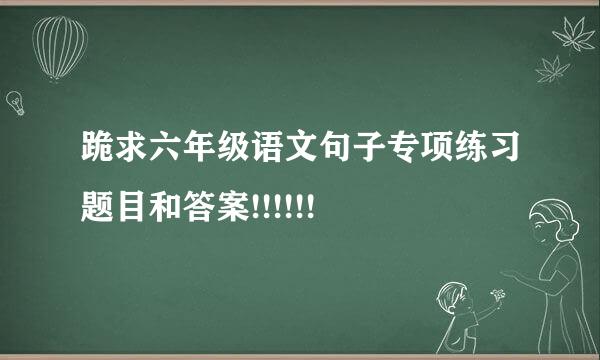
英国历史学家汤恩比博士文句精选
China’s past achievement and historical experience have endowed it with the qualifications that the West so conspicuously lacks. On the strength of that achievement, China has a more promising chance of shepherding mankind into political unity than any other country.
中国过去的成就和历史经验,已使其具足统一世界的资格;这正是西方所显著缺乏的。在这种成就的力量上,中国比任何其他国家都更有希望,带领人类政治走向大一统的世界。
◎汤恩比博士简介(Biography of Dr. Arnold J. Toynbee):
阿罗德。约瑟。汤恩比(1889-1975)是英国著名历史学家。他毕业于牛津大学,任伦敦大学的希腊语和历史学教授。曾代表英国 *** 参加两次世界大战后的和平会议。他发表过约三千篇论文著作,主要学术贡献是十二册的巨著《历史研究》(A Study of History),从社会文明发展的角度来研究历史。他认为,社会文明的衰落源于无法胜任道德与宗教的挑战,而非物质与环境的挑战。
(1) The religions that can salvage mankind
拯救人类之宗教:
“… the founders of the less crude religions and philosophies have perceived that the nature of divinity is not power but love, benevolence, and humanity. The Buddha, the Bodhisattvas, and Christ stand not for the exercise of power but for self-abnegation and self-sacrifice. Confuciani *** and Shinto stand for a harmonious co-operation between man and nature; Taoi *** for letting nature takes her course, undisturbed by impertinent and clumsy human interference. Surely the Weltanschauung that follows from these more perceptive and less aggressive religious and philosophical traditions is the one that now offers the most promising hope of salvaging mankind. The injunction to “subdue,” which modern man has taken as his directive, is immoral, impractical, and disastrous.”
Source: Toynbee, Arnold, 1973, The Genesis of Pollution, Horizon, Volume 15, No. 3, summer issue, pp.4-9.
译文:
一些较为文明的宗教和哲学的创始人认为,神性的本质并非权威,而是爱、仁慈与人道。佛菩萨和基督并非权威施行者的象征,而是代表克已奉献和自我牺牲;儒家与神道教代表人与自然的和谐互助合作;道教则以自然为导归,不为人类粗鲁笨拙的行为所扰乱。诚然,在这些格外睿智而温和的宗教及哲学传统基础上所建立的世界观,才是现前拯救全人类最大的希望。现代人热衷于“征服对方”,这种观念不仅毫无道德、不切实际,而且祸害无穷。
出处:汤恩比, A. 1973, 《污染的起源》,文出自《地平线》杂志,第15册第3期,4-9页。
(2)Who is the Inheritor of the Earth?
谁是地球的继承者?
The course of Chinese history has been cyclical; yet China has been more successful than the west in solving two crucial problems: it as succeeded for centuries in holding together millions of people in relatively stable domestic peace and order, and it has also succeeded in assimilating a foreign ideology, Buddhi *** , in a way that enriched the indigenous civilization.
For more than five centuries China was split into a number of competing local states. But in 221 B.C. the country was unified politically, and since then ins political unity has never been more than temporarily disrupted, while its cultural unity has never been lost.
As early as the second century B.C., the emperor Han Wu-ti realized that China's political unity must be buttressed by the creation of a professional civil service in which the qualification for entry would be merit, and the test of merit he chose was a proficiency in Confucian philosophy.
译文:
中国历史不断地周而复始的改朝换代。然而,中国比西方更成功的解决了两个主要问题。其一,数百年来,中国国内在和平而有规律,相对较安定的环境中,成功地维系了数百万人的团结一致。再者,中国成功的融合了一个外来的思想文化—佛教,佛教丰富了中国本土文明。
在历史上。中国曾有超过五百年的分裂时期(春秋战国的五百年中,中国分裂成许多小诸侯国),但是在公元前两百二十一年,整个国家在政治上大一统了。之后,中国的政治始终是统一的局面,再没有长期分裂过,且在文化上,从未丧失她的整体性。
早在公元前两个世纪,汉武帝已经了解,要保持中国政治的一统,必须培训一批专业优秀的 *** 官员来维系,官员的合格标准,他则选择对儒家哲学精通深入程度来考核。
In the twentieth century mankind is in much the same state of mind as the Chinese were in the third century B.C. We are the prisoners of an age-old habit of political disunity and of consequent warfare between competing local states. This habit has become so deeply ingrained that we are reluctant to be liberated from it; yet we now recognize that if we fail to unite politically on a global scale, the “annihilation of distance may result in the annihilation of life.
Dare we hope that China will meet the world's desperate need? Since the disintegration of the Roman Empire, Western state *** anship has been dedicated not to re-establishing political unity but to frustrating attempts to reattain it. The West has deliberately disqualified itself for unifying the world politically. China's past achievement and historical experience have endowed it with the qualifications that the West so conspicuously lacks. On the strength of that achievement, China has a more promising chance of shepherding mankind into political unity than any other country.
Source: Toynbee, Arnold, 1974, Inheritors of the Earth? Horizon, volume 16, No.3, summer, pp.18-19.
译文:
……二十世纪的人类与公元前三世纪(战国时代)的中国人,在心态上非常相同。我们已经成为政治分裂,以及由于政治分裂而导致的国与国之间的竞逐与战争,这种古 *** 惯的囚奴。这种习气已经根深蒂固的深植于我们心中,使我们不愿意从这习气牢笼中解放。然而,我们现在已经意识到,如果不能实行全球性的政治统一,这种毁灭性的疏离将导致所有生命的毁灭。
我们胆敢希望中国能满足世界迫切的需求吗?自从罗马帝国解体以来,西方的政治并没有致力于重建统一,而是破坏性的企图阻止统一。西方已有意使自已不具有政治上统一世界的资格。中国过去的成就和历史经验,已使其具足统一世界的资格;这正是西方所显著缺乏的。在这种成就的力量上,中国比任何其他国家都更有希望,带领人类政治进入大一统的世界。
出处:汤恩比,A. 1973, 《地球的继承人?》, 文出自《地平线》杂志,第16册第3期,18-19页。



